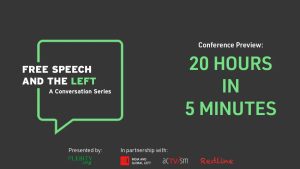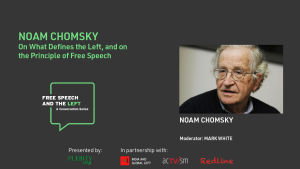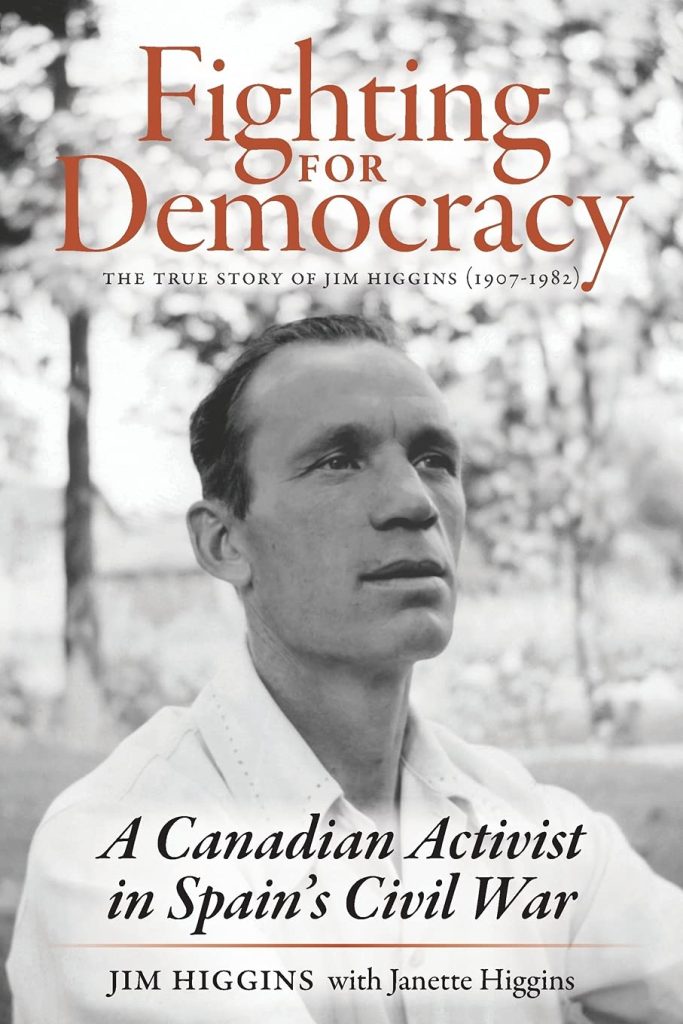
Jim Higgins – Fighting for Democracy. A Canadian Activist in Spain’s Civil War
I couldn’t be myself
“I couldn’t be myself,” or words to that effect: It was written in pencil on a piece of scrap foolscap I found amongst my father‘s papers after he died in 1982. He wrote that sentiment in 1977 when he was working on his memoir. My father’s name was Jim Higgins, and his book is called Fighting for Democracy: a Canadian Activist in Spain’s Civil War. It was not published until 2020.
Jim Higgins defied Canadian law to fight on the side of Spain’s democratically elected government in the Spanish Civil War. He volunteered with the International Brigades in 1937 as an anti fascist and fought with Canada’s Mackenzie Papineau Battalion as a machine gunner. He also carried out ‘special assignments’ with other divisions and returned to Canada in February 1939.
We have his book because at Christmas 1976, we five children asked him to write his story for us. Even though we’d probed him for information, his past had remained mysterious. It turned out he took us seriously and wrote all through 1977.
In 1978 something remarkable happened: He was found by Manuel Alvarez, a boy whose life he’d saved in Spain in July 1938. It became an international human interest story and Manuel went on to write a book, The Tall Soldier: My Forty Year Search for the Man Who Saved My Life, published in 1980 to critical acclaim. When journalists and academics learned my father had written his memoir, he was encouraged to get it published. They felt it was an important contribution to Canadian working class history.
The Tall Soldier– My 40 Year Search for the Man Who Saved My Life – Manual Alvarez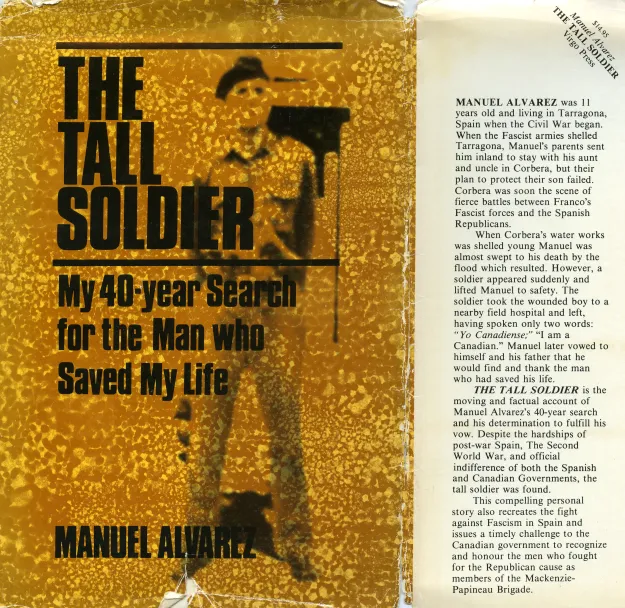
It also became apparent that I—having had some experience—would be the one to edit and publish it. I wasn’t ready to tackle (or even read) his manuscript until 40 years later. The revelations were many, including that he’d written the first part in 1939. In 1977, he was finally ready to be public about who he really was. He was 70 years old and had spent more than half his life feeling he couldn’t be himself.
One learns from his book that Jim Higgins demonstrated strength of character from an early age. As an orphaned child in England (we children didn’t even know he’d been orphaned!), he stood up to a cruel teacher at his boarding school which led to the teacher being fired. He also saved two people from drowning as others stood around. All before he was 17. In 1930s Canada, he was a union organizer and activist for the thousands of single unemployed men.
He and his comrades understood the role of capitalism. They knew what Marx was about before his ideas became twisted. They also saw the principles of communism quashed by Stalin and others. My father was open to ideas and arguments from others on the Left, including members of ethnic organizations, Canada’s Communist Party, churches that engaged in support and advocacy for the downtrodden, and those in his own party, the Cooperative Commonwealth Federation (CCF).
He felt free to express his opinions—prudently—but he wouldn’t be tied down. He was an individualist and reserved the right to think for himself. Party lines were meant to be questioned. He understood how power could corrupt.
Things culminated for him In 1939 when he helped bring citizens on the Left together in common cause. It happened in Saskatoon when he managed the United Reform Movement by-election campaign for a like-minded candidate, a Presbyterian minister, the Rev. W.G. Brown. The Leftist parties and organizations voted as one to defeat the long incumbent Liberal. It has gone down in Canadian history as an historic one-time event.
My father had learned this lesson of unity during the Spanish Civil War where he saw the downsides of a fractured Left. Armed with this example, he was able to convince others working in that election to set aside their differences for the greater good. It’s clear to me he had the respect of many. I view it as my father’s shining moment: he was able to fully act on his (pragmatic) ideals.
The Royal Canadian Mounted Police, or RCMP, had opened a file on him in 1935 when he was escorted from Saskatchewan’s Dundurn Relief Camp as a ‘radical’ for leading a delegation of inmates protesting camp conditions. And, yes, he participated in the On-to -Ottawa Trek and woke up in a jail cell after the Regina Riot.
RCMP surveillance and harassment increased in 1939, the year he returned from Spain and headed home to Saskatoon. They made his life difficult from the beginning. He was labeled an agitator, a Red, and a communist as he helped with a program for wounded SCW veterans across the Prairie Provinces and later worked on getting Rev. Brown elected. He also volunteered in early September 1939 to fight in World War Two but was turned down as a security risk.
The winter following that December 1939 by-election, he hid out in the boiler room of an apartment building where a friend was superintendent. As soon as spring arrived, he headed to British Columbia, bought a bike, entered the U.S. illegally, and rode his way east. Shortly after he left Saskatoon, the RCMP executed a search warrant at his last known address. I know this because I received his file in 2019.
He was away from Canada for a year; the last five months in New York on the lower east side amongst Jewish American International Brigade veterans who’d fought with the Lincoln Battalion. He was never to return to Saskatoon. Instead, he came back from New York and ended up in Peterborough, Ontario for the rest of his life.
Until 2017, when I began to tackle his manuscript, I didn’t know that his home in Canada before he met my mother in the early 1940s had been Saskatoon. It is now obvious he went to Peterborough, a place he’d never been before, in the hope of escaping attention from the RCMP.
That was not to be. When I received his RCMP file which I used to document his manuscript and much of what I’ve written here including the United Reform Movement election campaign, I also learned he had been surveilled monthly when I was growing up In 1950s Peterborough. I’m sure he would have been aware. The effects of spillover McCarthyism and RCMP surveillance didn’t completely shut him down; he continued with his union and political activities. But he was a tamped down version of himself, and it’s no doubt the reason he could never tell us children his story.
It took me three years to edit and document his book, so I believe I’ve come to know my father pretty well. It’s only since I published that I’ve realized the Left has changed significantly from my father’s day. I’ve even changed my mind about the dedication because so much has changed recently.
When I published in 2020, besides my parents, I dedicated the book to “today’s young people” and wrote, “democracy, world health and social justice are at stake. Your activism makes a difference.” Less than three years later, I would not put it that way. I’ve come to know how ‘social justice’ has become perverted; how it’s partly responsible for shutting down free speech with capitalist interest support.
I became vaguely aware around the time I published, that erudite intelligent people were being canceled for their views, including respected journalists and academics and, in particular, a Canadian women’s rights activist, Meghan Murphy, who was supported by the head of Toronto Public Libraries when an angry crowd of trans activists tried to get her talk canceled at a branch in 2019. Canada’s Centre for Free Expression also supported her right to speak.
My issue is women’s rights, so that got my attention. I did some quick research of Meghan Murphy’s views which seemed mostly reasonable to me, though I could see how they might be controversial. What I couldn’t understand was the vitriol and intimidation displayed by the huge crowd of protestors outside the library where she spoke.
It was concerning, but I was busy with the book. As I learned more, I became alarmed that women’s rights were being rolled back, then I became aware the rights of gays and lesbians were also threatened. Like everyone else, I thought that those rights had largely been settled for decades.
Mainstream media wasn’t reporting much on these issues and I’ve only learned what I have because I opened an anonymous Twitter account. I’ve now added parents’ rights and children’s health, safety and well-being to the mix. Alternative online media like Substack are where I find nuance and proper journalism. Tara Henley’s Substack is a favorite.
As I tried to talk to friends about my concerns, I was often met with apathy or perhaps indulgence; it was hard to tell. Or I was shut down. No debate, no conversation allowed. One friend listened with skepticism but put up with my rants and is gradually coming around. It was disconcerting. I couldn’t freely be myself as I had been the last time women’s rights were on the table. It wasn’t normal.
I am encouraged that mainstream media are now reporting on these issues in the U. K., but not a peep until recently in Canada—thank you National Post—unless it’s making genuinely concerned people like me out to be bigots and hatemongers. As I write this, the New York Times is standing up to the bullies within and without and just beginning to publish some good old fashioned journalism on these topics. The CBC not so much.
No debate about these huge—some might say dangerous—societal changes has been allowed until recently and only in certain quarters. We are told to be kind. Anyone who wants to debate is called a bigot or worse. I’ve come to realize the so-called social justice movement is not about social justice at all. It’s about Identity Politics and about imposing legislation and social norms based on dangerous ideologies.
AND it’s the first top down civil rights movement ever. Nothing grassroots about it when you follow the money. There’s a word for where this is heading unless the silent majority figures it out and speaks up. That word is totalitarianism.
So, yes—as I noted in my dedication—democracy and world health are at stake, but for different reasons than I thought, and I’ve come to realize the dangers inherent in so-called ‘social justice.’
With this piece, I am coming out of the closet. I need to feel free to say what I think. It parallels what my father wrote on that scrap of paper when he said he couldn’t be himself. The spillover effect of U. S. McCarthyism on him is similar to the effect of ‘social justice warriors’ on so many of us holding classic liberal values and/or on the Left today.
Free speech is the cornerstone of a healthy democracy, but it is being quashed by radical so-called Left wing activists who brook no debate; in my and other’s opinions, because they have little to say that would stand up to scrutiny in a genuine debate.
And I’ll make one more point relating to Canadian politics. In 1960 Jim Higgins was excited to work on Walter Pitman’s campaign for the New Party. His party, the Cooperative Commonwealth Federation, had petered out, and this was a test run for its replacement. In the next federal election, the New Party was renamed the New Democratic Party (NDP) and ran its first roster of candidates.
The NDP was a grassroots party of labor unions and the working class. I say ‘was’ because, In my view, it no longer is; it’s just a branch of the not-so-Liberal Party. Harsh maybe, but I honestly don’t believe my father would recognize it. I think he, like me, would find himself politically homeless. This conclusion has not been reached lightly.
I’ve always voted center/left, usually for the candidate rather than the party. I will continue that strategy. The question is, will I be offered a candidate who is aligned with my values; one prepared to be called a bigot? One brave enough to speak up against the juggernaut of Identity Politics?
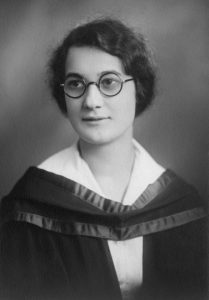
Reta Palliser (1910-1961)
Janette Higgins has written this piece to honor her parents, and particularly her mother, Reta Palliser, for International Women’s Day 2023. Both were feminists in their own ways. Janette has a Sociology degree from the University of Toronto and has published several travel guides. She can be found on Twitter @1930smemoir.
Image: Jim’s beloved wife and partner, Reta Palliser (1910-1961) at the time of her 1935 graduation from Queens University in Kingston, Ontario. He was to meet this ‘woman like no other’ in 1942.


